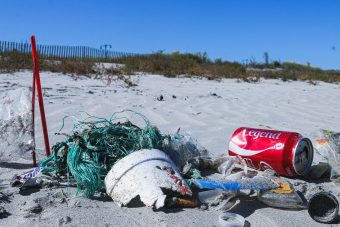
Ms. Inger Andersen, Executive Director of the UN Environment Programme does a Q&A on the deliberations by Member States on a global agreement on plastic pollution at the upcoming UN Environment Assembly
Do you have a specific agenda for what will come up at the session concerning the plastics convention?
The resumed fifth session of the UN Environment Assembly (UNEA), to take place in Nairobi, Kenya, is an important opportunity for countries to make progress on addressing the challenge of plastic pollution. Member States will be deliberating on proposals at the resumed fifth session of UNEA with the aim to establish an intergovernmental negotiating committee (INC) to work towards a legally binding global instrument. I am confident that Member States will decide on the path forward that makes a real difference to address plastic pollution.
What comes next? How long may it take to reach an agreement?
Member States are set to deliberate this year at the resumed session of UNEA on an international legally binding instrument, commencing its work in 2022 and with the goal of completing by the sixth session of UNEA.
This would make for a highly ambitious timeframe, reflecting Member States’ understanding of the urgency to make progress on this critical environmental challenge.
How do you expect to handle competing ideas? Specifically, should an agreement cover creation of plastics as well as disposal? Is the agreement likely to cover just ocean pollution, or all plastic pollution? May different types of plastic or ingredients in plastic be banned or treated differently?
At the end of the day, the scope of a global instrument will be decided by Member States in a multilateral setting. In the spirit of heeding the call from the UN Secretary-General for a networked and inclusive multilateralism, a strong negotiation process will be one which embraces different points of view and engages with a variety of stakeholders from the get-go. We seek rapid, ambitious and meaningful global action to curb the scourge of plastic pollution and this means incorporating different views to arrive at a framing that allows us to meet a range of economic, social and environment objectives.
The proposals being deliberated by Member States envision actions, from source to sea, that address all sources of pollution along the whole lifecycle – from production through disposal and reduction of the leakage of existing plastic currently in the global ecosystem.
Member States will need to consider in their negotiations the different types of plastics and additives within them, especially to allow plastics to be recycled safely and to foster a circular plastics economy.
More:
Is an agreement likely to rely on national self-reporting? Or are nations likely to underestimate their contributions to plastic disposal?
This is an important issue for Member States to deliberate further on. The demonstration of credible, continuous progress will help to secure political support and financing, and ultimately enhance impact over the long term.
Most Multilateral Environmental Agreements (MEAs) include provisions on reporting, i.e. Parties agree to provide information on the way they have been implementing the MEA at the national level. Reporting can be a useful tool for Parties to self-assess their compliance with the MEA and reflect on challenges and opportunities for improved implementation. But it is also a useful tool for the Parties collectively to exchange information on measures taken for the implementation of the MEA and the effectiveness of these measures. On the basis of national reports, the Secretariat is called to prepare a synthesis report highlighting the main trends and challenges in implementation, assisting Parties to consider how to enhance the overall effectiveness of the MEA at issue.
At the same time, many Parties to MEAs have at times expressed concerns over “reporting fatigue” and this is something we do need to seriously keep in mind as we assess the optimum review process for tracking our progress on stemming plastic pollution.
A number of important efforts are underway to monitor and track plastic pollution and marine litter can support and complement national reporting. This includes, for example, National Guidance for Plastic Pollution Hotspotting and Shaping Action developed by the IUCN, UNEP and the Life Cycle Initiative; the Minderoo Foundation Plastic Waste Makers Index; Guidelines For The Monitoring And Assessment Of Plastic Litter In The Ocean (developed by Group of Experts on the Scientific Aspects of Marine Environmental Protection); and the Back to Blue.
You can read the whole interview HERE.
Source: UNEP



